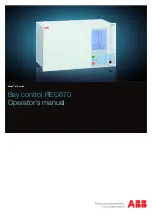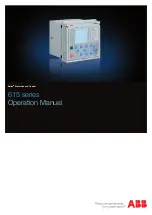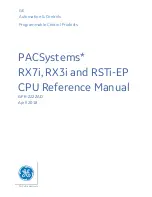
9440300990 Rev J
65
DECS-250
Limiters
Automatic adjustment (scaling) of the overexcitation limiter and stator current limiter is possible through
the DECS-250 auxiliary control input. Limiter scaling settings are illustrated in Figure 53. OEL and SCL
scaling may be independently enabled and disabled
A
. Automatic adjustment of the OEL and SCL is based
on six parameters: signal and scale for three points (levels).
With the scaling input set to
Auxiliary Input
, the signal value
B
for each point represents the auxiliary
control input. This input can be a 4 to 20 mAdc signal applied to terminals I+ and I– or a –10 to +10 Vdc
signal applied to terminals V+ and V–. (The input type is selected in BESTCOMS
Plus
). See the
Auxiliary
Control
chapter of this manual for details.
With the scaling input set to
AEM RTD #
, the signal value for each point represents an AEM RTD input in
degrees Fahrenheit. See the
Analog Expansion Module
chapter of the manual for details.
The scale value
C
for each point defines the limiter low level as a percent of rated field current for the OEL
and rated stator current for the SCL.
Figure 53. Limiter Scaling Settings
A
OEL and SCL Scale Enable:
Select Auxiliary Input, AEM RTD 1 to AEM RTD 8, or Disabled.
B
Signal:
Adjustable from –10 to +10 in 0.01 increments when
Auxiliary Input
is selected.
Adjustable from –58 to +482 in increments of 1 when any
AEM RTD
input
is selected.
C
Scale:
Adjustable from 0 to 200 in increments of 0.1.
Underfrequency Limiter
BESTCOMSPlus Navigation Path:
Settings Explorer, Operating Settings, Limiters, Underfrequency
HMI Navigation Path:
Settings, Operating Settings, Limiters, UEL
The underfrequency limiter is selectable for underfrequency limiting or volts per hertz limiting
A
. These
limiters protect the generator from damage due to excessive magnetic flux resulting from low frequency
and/or overvoltage.
Underfrequency and volts per hertz limiter settings are illustrated in Figure 56.
If the generator frequency decreases below the corner frequency
B
for the selected underfrequency slope
C
(Figure 54), the DECS-250 adjusts the voltage setpoint so that the generator voltage follows the
underfrequency slope. The adjustment range of the corner frequency and slope settings enables the
DECS-250 to precisely match the operating characteristics of the prime mover and the loads being
applied to the generator.
Summary of Contents for DECS-250
Page 2: ......
Page 6: ...iv 9440300990 Rev J Revision History DECS 250 ...
Page 16: ...xiv 9440300990 Rev J Contents DECS 250 ...
Page 20: ...4 9440300990 Rev J Introduction DECS 250 ...
Page 28: ...12 9440300990 Rev J Power Stage DECS 250 ...
Page 32: ...16 9440300990 Rev J Voltage and Current Sensing DECS 250 ...
Page 40: ...24 9440300990 Rev J Synchronizer DECS 250 ...
Page 52: ...36 9440300990 Rev J Auxiliary Control DECS 250 ...
Page 56: ...40 9440300990 Rev J Contact Inputs and Outputs DECS 250 ...
Page 84: ...68 9440300990 Rev J Limiters DECS 250 ...
Page 114: ...98 9440300990 Rev J Power System Stabilizer DECS 250 Figure 96 PSS Parameter Settings ...
Page 124: ...108 9440300990 Rev J Stability Tuning DECS 250 ...
Page 126: ...110 9440300990 Rev J Mounting DECS 250 Figure 103 Overall and Projection Mounting Dimensions ...
Page 127: ...9440300990 Rev J 111 DECS 250 Mounting Figure 104 DECS 250 Escutcheon Plate Dimensions ...
Page 198: ...182 9440300990 Rev J Timekeeping DECS 250 ...
Page 210: ...194 9440300990 Rev J CAN Communication DECS 250 ...
Page 304: ...288 9440300990 Rev J Maintenance DECS 250 ...
Page 316: ...300 9440300990 Rev J Specifications DECS 250 ...
Page 334: ...318 9440300990 Rev J Analog Expansion Module DECS 250 ...
Page 351: ......
















































